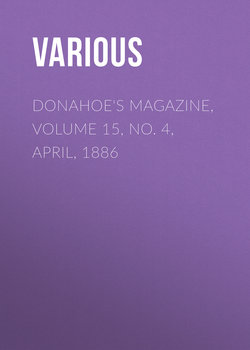Читать книгу Donahoe's Magazine, Volume 15, No. 4, April, 1886 - Various - Страница 4
Echoes from the Pines
Оглавление" – , This, nor gems, nor stores of gold,
Nor purple state, nor culture can bestow,
But God alone, when first His active Hand
Imprints the secret bias of the soul."
The palm, the laurel, and all the fountains of Pindus, Helicon and Parnassus, were sacred to the muses. The deep and dark pine woods of Maine, if not sacred to the muse of the author of "Echoes from the Pines," seem at times to have been a source of inspiration to her. We say "at times," and in a relative sense only, for assuredly, Margaret E. Jordan, the gifted author of the beautiful volume of poems, with the above title, sought her sources of inspiration at a higher fount than this, or any named in the pages of ancient mythology. Of her, indeed, it may be truly said, —
"His active hand
Imprints the secret bias of the soul."
These poems, about fifty in number, are scattered throughout the work like wild flowers o'er mead and hill, in copse and glen. They are, to some extent, artless in composition, free and flowing in style, garnished with pure and holy thoughts, and most of them, while stamped with the royal sign of deep religious thought, – truest source of all poetic inspiration, – are free of the namby-pambyism common to what are sometimes called "religious" poems.
Nearly all these poems are written in words of one syllable; that, at least, is a chief characteristic of them. This simple beauty of composition is oftener felt than observed. Thus, in our immortal lyrics, the Irish Melodies, Moore deals largely in this style.
Take a glance at the following: —
"The harp that once through Tara's hall
The soul of music shed,
Now hangs as mute on Tara's wall,
As if that soul were fled;
So sleeps the pride of former days,
So glory's thrill is o'er,
And hearts that once beat high for praise,
Now feel that pulse no more."
This beautiful simplicity is too often overlooked by the lovers of the Irish Bard, yet it indicates great strength of mind and a powerful pinion not only in poetry but in prose. (Vide, Cardinal Newman's Apologia).
The patriotic poems in Miss Jordan's collection are full of fervent pathos and fine feeling.
Take this stanza for example: —
"'Twas no disgrace to be Irish
In the far-famed days of old,
When the tale of our redemption
In Tara's halls was told.
When the holy feet of Saint Patrick
Blessed the land whose soil they trod,
And a pathway traced, yet never effaced,
From Ireland to God.
"'Tis no disgrace to be Irish,
Or to bear the faith to-day
That Ireland's sons have cherished
Thro' many a weary way.
What! a disgrace to be Irish!
A pride and a joy let it be!
More than fortune or fame, prize the faith and the name,
Of the Saint-hallowed isle of the sea."
In the spirited poem, "Leave their Fair Fatherland," in which the cruel process of emigration as a panacea for the sufferings of Ireland is described by the author, the opening stanza gives the tone of the whole poem: —
"Leave the fair land of their fathers,
The graves of their grandsires – for what?
Have ye not hearts in your bosoms,
Or think ye the Irish have not?
When sounded our trumpet of battle,
Were they cravens? Nay, bravest of men!
And they fought till the 'stars' rose in triumph
Never to vanish again!"
Our poet is not above giving "A Bit of Advice," and the way she gives it is this: —
"Whene'er you find a chance to wed
A noble girl, don't slight it;
And if you cannot speak your mind,
Why, just sit down and write it."
But the fellow who couldn't "pop the question" to "a noble girl," would not deserve to get her, and we think the noble girl would say the same.
The above selections are by no means the best we could have given. They are selected at random, and chiefly because they admit of selection without injuring the sense of their meaning. In other instances it would have been necessary to quote the poems entire, and this, of course, was neither desirable nor practicable in the small space at command.
The author of these poems is not unknown in Boston and throughout the New England States. It would be an encouragement to her to find that her efforts were not without promise of reward, and confident we are that those who spend a dollar in purchasing this handsome volume will not regret it. We have all a duty to discharge in the encouragement of Catholic writers and here is an excellent chance.
The work is beautifully brought out by the spirited publishers, McGowan & Young, of Portland, Me. It is printed on the finest paper, well and handsomely bound, gold lettered and red edges. It has a dedication so brief and beautiful that we give it entire. It is a little poem in itself. Here it is: —
"To My Beloved Father and Mother."
Were it possible to reveal even a little of what this abdication means, and what it conceals, the effort of Margaret E. Jordan would reap a rich return for literary labors performed under trying circumstances. Our beautiful singer could not well refrain from writing about "Gethsemane." Her devotion and her love to our Suffering Lord must needs find its vent among the trees of Mount Olivet!
Procure a copy of "Echoes from the Pines," and the sweet music and balsamic odor will be deliciously refreshing and grateful to every sense.
P. McC.
